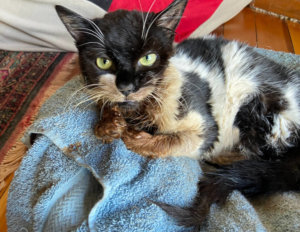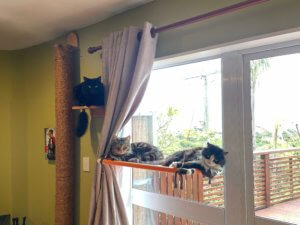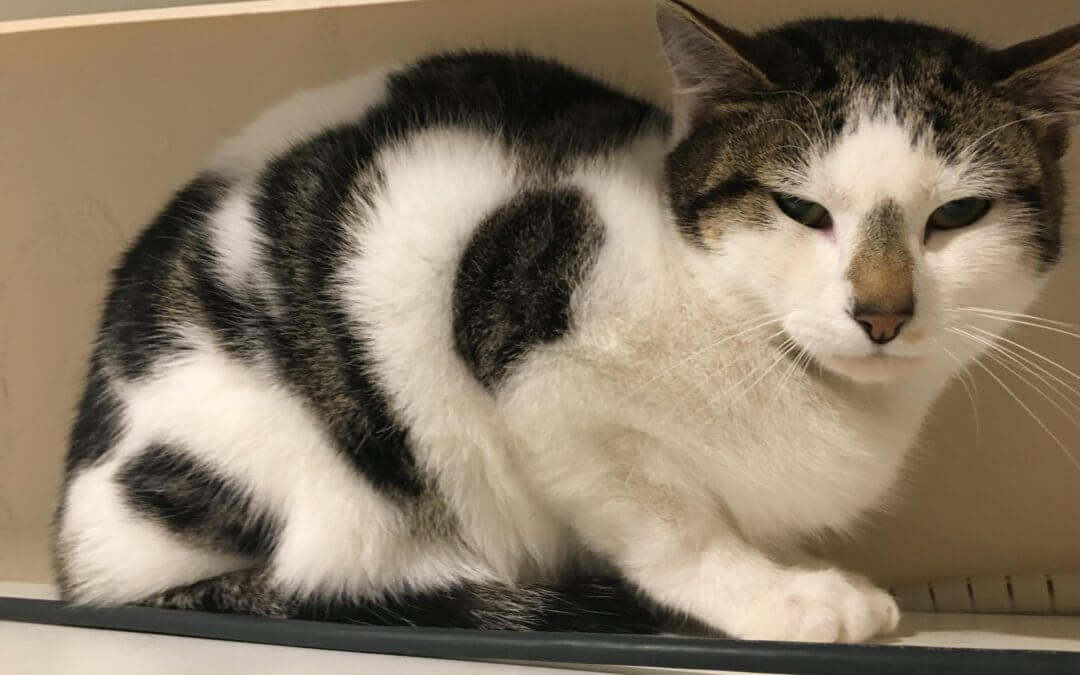
Pippin licks his paws (and belly) as a stress release
For us humans, stress is a normal part of life and requires healthy coping strategies to endure and manage. For our feline counterparts, stress can cause anxiety and frustration that may result in diseases and behavioural problems over time. Since cats are sensitive creatures, there are many factors that cause stress, such as a visit to the vet or a change in their environment.
In addition to these factors, a common cause of stress in felines is separation anxiety. Some breeds like the Burmese and Siamese are known to be codependent on their owners and are reliant on human contact to feel secure. Conversely, some breeds like the British Shorthair are independent and can better handle shorter periods alone. This is a factor to contemplate when you are looking for a British Shorthair for sale. Knowing this information will allow you to prepare for longer periods when you are away from home.

Pepper, who was adopted from our cafe, is British Shorthair.
Moreover, our feline companions are subtle creatures, so it can be tricky to spot the signs of stress in your cat. You may notice a slight change in their behaviour or may perceive this shift as your pet “acting out”. To help a stressed cat, here are the signs you should look out for:
Frequent Hiding and Social Withdrawal
Hiding and avoiding human contact is a telltale sign your cat is stressed. Cats usually hide when they feel threatened or stressed by a real or perceived threat or when they are sick. The most common reason why cats hide is due to unfamiliar people. When you have visitors, allow your cat time and space to warm up to them.
Frequent hiding and social withdrawal may also be caused by a big change, such as moving to a new home. It will take time for your cat to adjust to the new environment, so try to give your cat a sense of normalcy. Setting up your home for harmony and safety will reduce stress and make it easier for your pet to adjust to the new environment.
Inappropriate Elimination
Inappropriate elimination generally refers to a cat that is defecating or urinating outside the litter box, despite learning how to use the litter box long ago. A stressed cat may spray its urine on furniture or defecate in inappropriate spots around the home, such as the couch or in hard-to-reach places. This may be accompanied by digestive issues, such as diarrhoea and constipation.
Elimination issues can develop due to stress and other factors, such as a dislike for the location of the litter box, type of litter box, or the litter itself. Your cat may become stressed if you have multiple cats at home that share the same litter box. Once your cat starts to avoid using the litter box for whatever reason, this avoidance behaviour can lead to chronic stress. Hence, the best approach to this problem is to determine the underlying cause of stress by paying close attention to your cat’s elimination habits.
Excessive Grooming
Cats typically over-groom themselves to cope with boredom or stress. Compulsive grooming or psychogenic alopecia is typically triggered by a big change in the cat’s routine or environment. Lack of proper enrichment may also cause boredom and overgrooming. When this occurs, your cat may overgroom to make up for the lack of physical and mental stimulation.
Aggression Towards Others
If your cat is naturally loving and affectionate, you may notice a shift in its behaviour right away. A major sign your cat is stressed is when it suddenly becomes very combative and aggressive towards you, other household members, and other pets. Aggression is your feline companion’s way of expressing to you that something is not right and that it needs help.

photo by Aleksandar Popovski
Common stimuli that trigger stress and aggression include seeing a stray or outdoor cat through the window, loud noises, or an altercation with another cat or pet indoors. Unprovoked aggression towards humans is usually caused by overstimulation and mishandling. In most cases, cats exhibit aggression due to stress caused by an unfamiliar person or environment and real or perceived threats.
Lethargy and Increased Sleeping
Just because cats can sleep up to 20 hours per day, doesn’t necessarily mean your cat will. If you notice your cat has been sleeping excessively lately and appears tired, it could be a sign of stress caused by discomfort or an underlying disease. The best way to determine the cause of your pet’s lethargy is to set an appointment with your vet.

Our three cats love the window perch and climbing pole we set up
Final Thoughts
These are the common signs of stress in cats. By familiarising yourself with these symptoms, you can more easily detect the signs of stress in your feline companion. This makes it easier for you to provide comfort or reassurance to relieve and prevent stress in your home for a happy and content feline.
written as a guest post by Kate Teng who works with PetsforHomes in Australia “We’re passionate about animals and are dedicated to connecting pet lovers with ethical and responsible pet sellers”
We recommend contacting a cat behaviourist if you have tried all your vet’s suggestions.
Our favourite is Jeannette Vine https://www.catbehaviouralsolutions.com/

